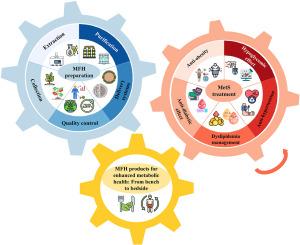Medicine food homology materials for promoting resilience against metabolic syndrome: Recent technology advances and challenges
IF 15.4
1区 农林科学
Q1 FOOD SCIENCE & TECHNOLOGY
引用次数: 0
Abstract
Background
Metabolic syndrome (MetS) denotes a constellation of risk factors that contribute to the onset of chronic metabolic diseases. Echoing the global burden of MetS, there is increasing interest in using “food as medicine” interventions to prevent and/or treat MetS. An in-depth understanding of all processes involved in the production of medicine food homology (MFH)-based products allows better design of these products to enhance human resilience against MetS.
Scope and approach
This review focuses on the novel processing technologies of plant-based MFH materials for enriching the metabolic health-promoting constituents and enhancing the therapeutic efficacy in MetS. In particular, we provide an overview of recent advances and challenges in the extraction, purification, and controlled delivery of MFH products and their bioactive constituents. We also propose feasible approaches to improve the quality control and standardization procedures of MFH products across the food and pharmaceutical industries.
Key findings and conclusions
Plant-based MFH materials can mitigate multiple aspects of MetS due to their unique and abundant bioactive constituents. Innovative and eco-friendly processing methods become increasingly popular for preparing MFH products enriched with bioactive compounds. Quality control strategies, such as targeted compound analysis, metabolomic fingerprinting and quality marker tracking, are crucial for ensuring the quality and safety of MFH products. Future trends in MFH product R&D emphasize intelligent manufacturing and precision nutrition. Overall, this review provides valuable perspectives on the potential application of MFH materials in managing MetS, and highlights the need to upcycle traditional MFH materials through sustainable material sourcing, efficient delivery and standardized green production.

促进抗代谢综合征韧性的药食同源材料:最新技术进展和挑战
代谢综合征(MetS)是指导致慢性代谢性疾病发病的一系列危险因素。与MetS的全球负担相呼应,人们对使用“食物作为药物”干预措施来预防和/或治疗MetS越来越感兴趣。深入了解药品食品同源性(MFH)产品生产中涉及的所有过程,可以更好地设计这些产品,以增强人体对MetS的抵御能力。范围和方法综述了植物性MFH材料在丰富代谢健康促进成分和提高MetS治疗效果方面的新工艺。特别是,我们概述了MFH产品及其生物活性成分的提取、纯化和控制输送方面的最新进展和挑战。我们还提出了可行的方法来改善食品和制药行业中MFH产品的质量控制和标准化程序。基于植物的MFH材料由于其独特和丰富的生物活性成分,可以减轻MetS的多个方面。创新和环保的加工方法越来越受欢迎,用于制备富含生物活性化合物的MFH产品。质量控制策略,如靶向化合物分析、代谢组学指纹图谱和质量标记跟踪,对于确保MFH产品的质量和安全至关重要。MFH产品研发的未来趋势强调智能制造和精准营养。总体而言,本综述为MFH材料在MetS管理中的潜在应用提供了有价值的观点,并强调了通过可持续材料采购、高效交付和标准化绿色生产对传统MFH材料进行升级利用的必要性。
本文章由计算机程序翻译,如有差异,请以英文原文为准。
求助全文
约1分钟内获得全文
求助全文
来源期刊

Trends in Food Science & Technology
工程技术-食品科技
CiteScore
32.50
自引率
2.60%
发文量
322
审稿时长
37 days
期刊介绍:
Trends in Food Science & Technology is a prestigious international journal that specializes in peer-reviewed articles covering the latest advancements in technology, food science, and human nutrition. It serves as a bridge between specialized primary journals and general trade magazines, providing readable and scientifically rigorous reviews and commentaries on current research developments and their potential applications in the food industry.
Unlike traditional journals, Trends in Food Science & Technology does not publish original research papers. Instead, it focuses on critical and comprehensive reviews to offer valuable insights for professionals in the field. By bringing together cutting-edge research and industry applications, this journal plays a vital role in disseminating knowledge and facilitating advancements in the food science and technology sector.
 求助内容:
求助内容: 应助结果提醒方式:
应助结果提醒方式:


